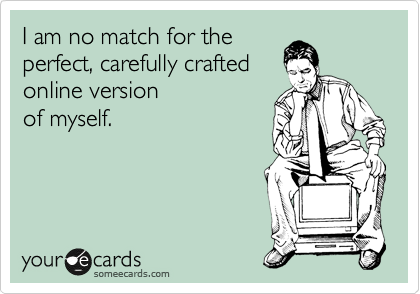 The perfect life, that’s what I called it – the phenomenon that has spread across the two social networks I frequent. Facebook Photos is nothing new and has come up here as a subject for discussion earlier. But its rise has been meteoric, just like the social network. The best vacations, the coolest friends, the hottest parties, the snazziest gadgets, seems everyone can haz it. 🙂 Twitter is not far behind. People, almost like brands, out to show their best side. Made for Facebook/Made for Twitter/ Lies of Life, call it what you will. Of course condolences would pour in if someone had a distressing update. Either outrage against the wrongdoer if any, or at least a +1 to show solidarity. Unfollow, unfriend you’d say, but these are not bad people, they just have a perfect life. 🙂 Unfortunately, the networks work as emotion aggregators too, forcing me to vent once in a while. [image source Check it out for more awesomeness :)] And yes, I generalise. 🙂
The perfect life, that’s what I called it – the phenomenon that has spread across the two social networks I frequent. Facebook Photos is nothing new and has come up here as a subject for discussion earlier. But its rise has been meteoric, just like the social network. The best vacations, the coolest friends, the hottest parties, the snazziest gadgets, seems everyone can haz it. 🙂 Twitter is not far behind. People, almost like brands, out to show their best side. Made for Facebook/Made for Twitter/ Lies of Life, call it what you will. Of course condolences would pour in if someone had a distressing update. Either outrage against the wrongdoer if any, or at least a +1 to show solidarity. Unfollow, unfriend you’d say, but these are not bad people, they just have a perfect life. 🙂 Unfortunately, the networks work as emotion aggregators too, forcing me to vent once in a while. [image source Check it out for more awesomeness :)] And yes, I generalise. 🙂
I have wondered about the motivation. Maybe we like to share happiness more than sadness by default. Maybe sadness is a private thing we choose only to share with dear ones. (do you think there’s a social network idea there? A mutant version of Path) Maybe the algorithms ensure I see only the happy ones. Or maybe it’s indeed true that our vanity stops us from showing that we have been humbled, beaten, saddened by a human hand or a twist of fate.
A few minutes after I tweeted about the perfect life, I got a message on the blog (deleted now) from an old dear friend S, who had gotten in touch after quite a while. In the long years before a virtual home, when a real diary was a lifesaver, hers would probably be the name that was mentioned most, before the rise of the thenceforth omnipresent D. 🙂
S isn’t on twitter, so she would have no idea of the coincidence. She was happy about the progress I was making, doing the things I love to do and generally having fun. And that led me to wonder if I, in my own limited way, was also feeding the perfect life network. So here’s setting the record straight. In case you see my vacation photos, restaurant visits and general attempts at humour and think that the story begins and ends there, you couldn’t be further from the truth.
As many of my posts would indicate, I have multiple ‘missed life crises’ – singer, author, theatre actor, h3ll, even cricketer, and perhaps a few more too, all skills I have either displayed to some degree or think I possess. 🙂 I think way too much for my own good and am forever irritated at the inequity of life (in terms of those more unfortunate) and not being able to do much about it. I am constantly trying to shed baggage and sometimes failing miserably. My feelings of insecurity would be legend if they were a published work. Thankfully D exists. There is more, but that’s enough fun at my expense. The silver lining is that I’m learning through it all. Meanwhile, all I’m trying to say is that the grass on the other side is probably photoshopped. If it’s not, they’ve probably worked hard to make it this way. And we can too, if we try. Please smile now, and mean it. Or I’ll have to ask you to Like the post 😉
until next time, open source happiness
PS: It was only recently that I gave off my fakemytrip.com domain to mygola. I had bought it thanks to an irritating status on FB, and had a 4sq based idea around it. 😀

Leave a Reply